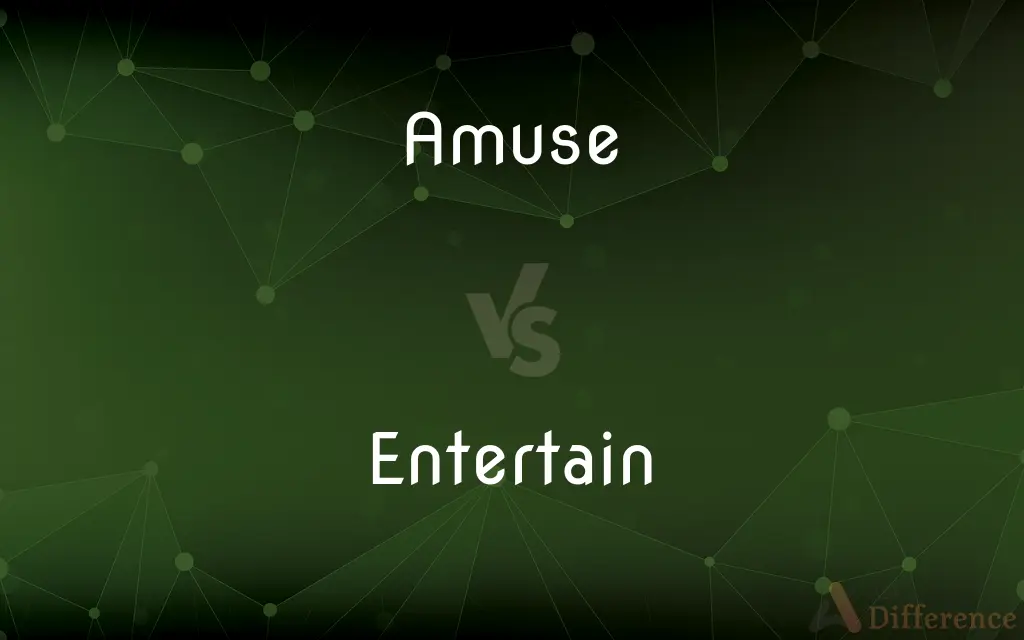Amuse vs. Entertain — What's the Difference?
By Maham Liaqat & Urooj Arif — Updated on April 3, 2024
Amusing involves causing laughter or providing light enjoyment, while entertaining encompasses engaging someone's attention or interest through varied forms of pleasure.

Difference Between Amuse and Entertain
Table of Contents
ADVERTISEMENT
Key Differences
Amusing someone typically involves light, often spontaneous moments of humor or joy, focusing on creating laughter or smiles. On the other hand, entertaining can be a broader concept that includes amusing but also encompasses performances, activities, or presentations designed to captivate an audience’s interest and provide enjoyment or pleasure.
While amusing actions are usually brief and can be simple, such as telling a joke or making a funny face, entertaining often requires more elaborate preparation or structure, like hosting a party, performing a concert, or presenting a play. Entertainment is designed to engage people for longer periods.
The goal of amusement is often to momentarily distract or inject joy into someone’s day, primarily through humor or playful actions. Entertaining, however, aims to hold an audience's attention, sometimes educating or invoking a range of emotions beyond just laughter or light-heartedness.
Amusement can occur in casual, everyday interactions without the need for an audience. For instance, a person might amuse themselves with a puzzle or a friend with a witty comment. Entertainment typically involves an audience, whether it’s a crowd at a concert, viewers of a television show, or participants in a game.
The effect of amusement is usually immediate, bringing about a quick smile or laugh. The impact of entertainment, however, can be more lasting, leaving the audience with memories, feelings, or thoughts to ponder long after the experience ends.
ADVERTISEMENT
Comparison Chart
Purpose
To provoke laughter or joy
To engage attention or interest
Activities
Simple actions or jokes
Performances, shows, games
Duration
Brief, often spontaneous
Longer, with structured engagement
Emotional Range
Primarily humor
Wide range, including joy, suspense, emotion
Audience
Can be self or a few individuals
Usually involves a larger audience
Effect
Immediate light-heartedness
Lasting memories or emotions
Compare with Definitions
Amuse
To make someone laugh or smile.
He amused the children with funny faces.
Entertain
To hold someone’s attention through performances or activities.
The magician entertained the crowd with his tricks.
Amuse
To distract or occupy in an enjoyable manner.
The puzzle amused him for hours.
Entertain
To host or welcome guests in a social setting.
They love to entertain friends at their home.
Amuse
To engage in something enjoyable or entertaining.
They amused themselves playing cards.
Entertain
To consider or give attention to an idea.
She entertained the possibility of traveling the world.
Amuse
To cause laughter or joy through humor.
The clown’s act was meant to amuse the audience.
Entertain
To provide enjoyment or pleasure.
They entertained guests with music and dance.
Amuse
To find something enjoyable in a light-hearted way.
She was amused by the comedy show.
Entertain
To engage an audience with a variety of performances.
The festival entertained people of all ages.
Amuse
To hold the attention of or occupy in an agreeable fashion
Amused myself with a puzzle.
Entertain
Provide (someone) with amusement or enjoyment
A tremendous game that thoroughly entertained the crowd
Amuse
To cause to laugh or smile by being funny
Amused the crowd with jokes.
Entertain
Give attention or consideration to (an idea or feeling)
Washington entertained little hope of an early improvement in relations
Amuse
(Archaic) To delude or deceive.
Entertain
To hold the attention of (someone) with something amusing or diverting.
Amuse
(transitive) To entertain or occupy (someone or something) in a pleasant manner; to stir (an individual) with pleasing emotions.
I watch these movies because they amuse me.
It always amuses me to hear the funny stories why people haven't got a ticket, but I never let them get in without paying.
Entertain
To extend hospitality toward
Entertain friends at dinner.
Amuse
To cause laughter or amusement; to be funny.
His jokes rarely fail to amuse.
Entertain
To consider; contemplate
Entertain an idea.
Amuse
To keep in expectation; to beguile; to delude.
Entertain
To hold in mind; harbor
Entertained few illusions.
Amuse
To occupy or engage the attention of; to lose in deep thought; to absorb; also, to distract; to bewilder.
Entertain
(Archaic) To continue with; maintain.
Amuse
To occupy or engage the attention of; to lose in deep thought; to absorb; also, to distract; to bewilder.
Camillus set upon the Gauls when they were amused in receiving their gold.
Being amused with grief, fear, and fright, he could not find the house.
Entertain
(Obsolete) To employ; hire.
Amuse
To entertain or occupy in a pleasant manner; to stir with pleasing or mirthful emotions; to divert.
A group of children amusing themselves with pushing stones from the top [of the cliff], and watching as they plunged into the lake.
Entertain
(Obsolete) To give admittance to; receive.
Amuse
To keep in expectation; to beguile; to delude.
He amused his followers with idle promises.
Whatever amuses serves to kill time, to lull the faculties, and to banish reflection. Whatever entertains usually awakens the understanding or gratifies the fancy. Whatever diverts is lively in its nature, and sometimes tumultuous in its effects.
Entertain
To show hospitality to guests.
Amuse
To muse; to mediate.
Entertain
To provide entertainment.
Amuse
Occupy in an agreeable, entertaining or pleasant fashion;
The play amused the ladies
Entertain
(transitive) To amuse (someone); to engage the attention of agreeably.
To entertain friends with lively conversation
The motivational speaker not only instructed but also entertained the audience.
Amuse
Make (somebody) laugh;
The clown amused the children
Entertain
To have someone over at one's home for a party or visit.
They enjoy entertaining a lot.
Entertain
(transitive) To receive and take into consideration; to have a thought in mind.
The committee would like to entertain the idea of reducing the budget figures.
To entertain a proposal
Entertain
(obsolete) To take or keep in one's service; to maintain; to support; to harbour; to keep.
Entertain
(obsolete) To meet or encounter, as an enemy.
Entertain
(obsolete) To lead on; to bring along; to introduce.
Entertain
(obsolete) Entertainment; pleasure.
Entertain
(obsolete) Reception of a guest; welcome.
Entertain
To be at the charges of; to take or keep in one's service; to maintain; to support; to harbor; to keep.
You, sir, I entertain for one of my hundred.
Entertain
To give hospitable reception and maintenance to; to receive at one's board, or into one's house; to receive as a guest.
Be not forgetful to entertain strangers; for thereby some have entertained unawares.
Entertain
To engage the attention of agreeably; to amuse with that which makes the time pass pleasantly; to divert; as, to entertain friends with conversation, etc.
The weary time she can not entertain.
Entertain
To give reception to; to receive, in general; to receive and take into consideration; to admit, treat, or make use of; as, to entertain a proposal.
I am not here going to entertain so large a theme as the philosophy of Locke.
A rumor gained ground, - and, however absurd, was entertained by some very sensible people.
Entertain
To meet or encounter, as an enemy.
Entertain
To keep, hold, or maintain in the mind with favor; to keep in the mind; to harbor; to cherish; as, to entertain sentiments.
Entertain
To lead on; to bring along; to introduce.
To baptize all nations, and entertain them into the services institutions of the holy Jesus.
Entertain
To receive, or provide entertainment for, guests; as, he entertains generously.
Entertain
Entertainment.
Entertain
Provide entertainment for
Entertain
Take into consideration, have in view;
He entertained the notion of moving to South America
Entertain
Maintain (a theory, thoughts, or feelings);
Bear a grudge
Entertain interesting notions
Harbor a resentment
Common Curiosities
What does it mean to amuse someone?
To amuse someone means to make them laugh or smile, providing light enjoyment.
What types of activities are considered entertaining?
Activities like concerts, movies, plays, parties, and games are considered entertaining.
Can entertainment also be amusing?
Yes, entertainment can include amusing elements, but it encompasses a broader range of activities designed to captivate.
What is the purpose of entertainment?
The purpose of entertainment is to engage someone’s interest or attention, offering enjoyment through various activities or performances.
How does one decide whether to amuse or entertain?
The choice depends on the context and desired outcome; amusing is about quick laughter, while entertaining aims for sustained engagement.
Is it possible to amuse oneself?
Yes, one can amuse oneself with activities or thoughts that bring joy or laughter.
What role does audience reaction play in amusement and entertainment?
Audience reaction is crucial; it validates the effectiveness of the humor or engagement in both amusement and entertainment.
Why is amusement important in daily life?
Amusement brings light-heartedness and joy, providing a necessary break from the routine or stress.
Is watching a comedy show considered amusing or entertaining?
Watching a comedy show is both amusing, due to the humor involved, and entertaining, as it engages the viewer’s attention.
Do all forms of entertainment require an audience?
While most forms of entertainment are designed for an audience, some, like reading or solitary gaming, can be enjoyed individually.
What makes a good entertainer?
A good entertainer captivates their audience, effectively conveying emotions or stories, and keeps them engaged.
Can a book be amusing and entertaining?
Yes, a book can be both amusing and entertaining if it provides laughter and keeps the reader engaged.
How do amusement and entertainment contribute to cultural experiences?
They enrich cultural experiences by providing shared moments of joy, learning, and engagement, fostering community and understanding.
How can amusement affect one’s mood?
Amusement can positively affect one’s mood by inducing laughter or joy, which can relieve stress and improve overall happiness.
Can entertaining activities be educational?
Yes, entertaining activities can also be educational, teaching new skills or information while engaging the audience.
Share Your Discovery

Previous Comparison
Unify vs. Unite
Next Comparison
Indefinite vs. InfiniteAuthor Spotlight
Written by
Maham LiaqatCo-written by
Urooj ArifUrooj is a skilled content writer at Ask Difference, known for her exceptional ability to simplify complex topics into engaging and informative content. With a passion for research and a flair for clear, concise writing, she consistently delivers articles that resonate with our diverse audience.














































